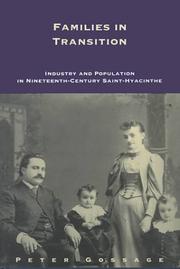| Listing 1 - 3 of 3 |
Sort by
|

ISBN: 128285805X 9786612858055 0773567828 9780773567825 0773518479 9780773518476 6612858052 Year: 1999 Publisher: Montreal : McGill-Queen's University Press,
Abstract | Keywords | Export | Availability | Bookmark
 Loading...
Loading...Choose an application
- Reference Manager
- EndNote
- RefWorks (Direct export to RefWorks)
Gossage uses a family-reconstitution method, drawing on local parish registers and manuscript-census schedules, to focus on marriage, household organization, and family size in this context of social and economic change. Family formation was profoundly affected as couples adjusted to the new urban, industrial setting. Gossage demonstrates that demographic behaviour was increasingly differentiated by social class, with distinct marriage and fertility patterns emerging among bourgeois and proletarian families. Bourgeois women who married in the 1860s, for example, were already limiting family size, a crucial shift that did not occur in working-class families until almost a generation later. Families in Transition demonstrates the extent to which stereotypes about family life in Quebec before the Quiet Revolution need to be revisited. Far from being passive, static, uniformly prolific, and constrained by religious and cultural perspectives, Saint-Hyacinthe families responded quickly to the changing realities of the day, reinventing marriage patterns and domestic arrangements to fit the new industrial capitalism of the nineteenth century. In this sense they were truly families in transition.
Family --- Households --- Family demography --- Industries --- Industrial production --- Industry --- Economics --- Demography --- Families --- Population --- Home economics --- Family life --- Family relationships --- Family structure --- Relationships, Family --- Structure, Family --- Social institutions --- Birth order --- Domestic relations --- Home --- Kinship --- Marriage --- Matriarchy --- Parenthood --- Patriarchy --- History --- Research --- Social aspects --- Social conditions --- Saint-Hyacinthe (Québec) --- Saint-Hyacinthe, Québec --- St.-Hyacinthe (Québec) --- Histoire --- Industries, Primitive --- Saint-Hyacinthe (Quebec)
Book

ISBN: 9781644697887 1644697890 1644697882 Year: 2022 Publisher: Boston, MA
Abstract | Keywords | Export | Availability | Bookmark
 Loading...
Loading...Choose an application
- Reference Manager
- EndNote
- RefWorks (Direct export to RefWorks)
The first detailed study of string quartets in late-eighteenth and early-nineteenth century Europe through the work of nine scholars who explore little-studied aspects of this multi-faceted genre.
String quartet --- MUSIC / Essays. --- Quartet, String --- String quartets --- Chamber music --- Musical form --- History and criticism --- . --- Beethoven. --- Fugue. --- Hyacinthe Jadin. --- Paris. --- Pierre Rode. --- String quartet. --- Vienna. --- analysis. --- cultural context. --- quatuor brillant.
Book
ISBN: 2763752950 2763752969 9782763752969 9782763752952 Year: 2020 Publisher: Quebec
Abstract | Keywords | Export | Availability | Bookmark
 Loading...
Loading...Choose an application
- Reference Manager
- EndNote
- RefWorks (Direct export to RefWorks)
"Participant aux affaires publiques, côtoyant les cercles de privilégiés de sa communauté (Terrebonne), François-Hyacinthe Séguin est un fervent catholique, lecteur de Voltaire, pourfendeur des révolutions libérales et rationaliste. Son journal, rédigé quelques années avant la rébellion, relève à la fois du genre mémorialiste, du journal intime et des notes personnelles. Il offre aux lecteurs un portrait savoureux et teinté d'ironie de la société bas-canadienne de l'époque : du simple journalier de Terrebonne aux grands hommes politiques de la colonie britannique, rien n'échappe à la plume colorée et incisive de son auteur. Le journal témoigne de la vie communautaire, du pouvoir local et des enjeux de société liés à la démocratie parlementaire. Pourtant, bien plus qu'un simple portrait des mœurs sociales ou politiques, ce journal d'un loyal de la bourgeoisie canadienne-française donne voix à des idées et des discours que l'histoire contemporaine a trop souvent ignorés."--Page 4 of cover.
French-Canadians --- Canadiens français --- Social conditions --- Conditions sociales --- Séguin, François-Hyacinthe, --- 1791-1899 --- Canada --- Terrebonne (Québec) --- Canada. --- Québec --- History --- Politics and government --- Histoire --- Politique et gouvernement
| Listing 1 - 3 of 3 |
Sort by
|

 Search
Search Feedback
Feedback About UniCat
About UniCat  Help
Help News
News